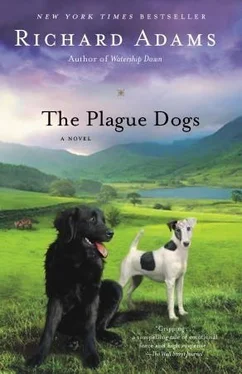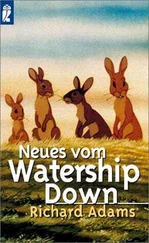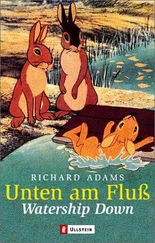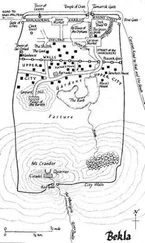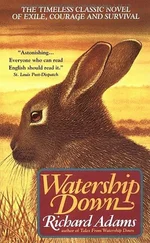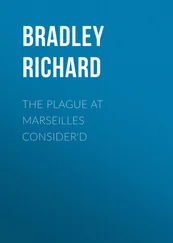Richard Adams - The Plague Dogs
Здесь есть возможность читать онлайн «Richard Adams - The Plague Dogs» весь текст электронной книги совершенно бесплатно (целиком полную версию без сокращений). В некоторых случаях можно слушать аудио, скачать через торрент в формате fb2 и присутствует краткое содержание. Город: New York, Год выпуска: 2007, ISBN: 2007, Издательство: Ballantine Books, Жанр: Природа и животные, Фэнтези, на английском языке. Описание произведения, (предисловие) а так же отзывы посетителей доступны на портале библиотеки ЛибКат.
- Название:The Plague Dogs
- Автор:
- Издательство:Ballantine Books
- Жанр:
- Год:2007
- Город:New York
- ISBN:978-0-345-49402-3
- Рейтинг книги:3 / 5. Голосов: 1
-
Избранное:Добавить в избранное
- Отзывы:
-
Ваша оценка:
- 60
- 1
- 2
- 3
- 4
- 5
The Plague Dogs: краткое содержание, описание и аннотация
Предлагаем к чтению аннотацию, описание, краткое содержание или предисловие (зависит от того, что написал сам автор книги «The Plague Dogs»). Если вы не нашли необходимую информацию о книге — напишите в комментариях, мы постараемся отыскать её.
, Richard Adams creates a lyrical and engrossing tale, a remarkable journey into the hearts and minds of two canine heroes, Snitter and Rowf, fugitives from the horrors of an animal research center who escape into the isolation—and terror—of the wilderness.
The Plague Dogs — читать онлайн бесплатно полную книгу (весь текст) целиком
Ниже представлен текст книги, разбитый по страницам. Система сохранения места последней прочитанной страницы, позволяет с удобством читать онлайн бесплатно книгу «The Plague Dogs», без необходимости каждый раз заново искать на чём Вы остановились. Поставьте закладку, и сможете в любой момент перейти на страницу, на которой закончили чтение.
Интервал:
Закладка:
The results of all the experiments so far had been most informative, yielding the basic information that while some of the birds succeeded in returning home, others did not. Many, in fact, in obedience to their defective stimuli, had flown straight out to sea until they perished; which was most interesting. One could draw the firm and valuable conclusions first, that birds whose faculties had been impaired were less swift and competent in getting home than birds whose faculties had not; and secondly, that in any given group, some succeeded in returning while others, who did not, presumably died. Six months ago Mr. Lubbock had taken part in a television programme on the project, when he had explained the pattern of the experiments and the system by which various possibilities were being eliminated. Since then, important evidence had been obtained in support of the theory that the birds possessed an instinct not really explicable in scientific terms. This was humorously known at Lawson Park as the “R.N.K.” theory, from a remark once made by Tyson to Mr. Lubbock—”Reckon nobody knaws.”
Snitter and Rowf made their way cautiously forward between the cages, half-expecting to meet some kind of enemy in this strange place. Or perhaps one of the whitecoats, with brisk walk and purposeful tapping of heels, might suddenly open a door and, pausing just inside in the way they did, raise his soap-smelling hand to the wall in the gesture that created light. All remained quiet, however, and they pattered on, side by side, to the further end of the aviary. Here they were once more met by double doors leading into the next block. Snitter eased his way through and Rowf followed as before.
At once, though in a place similar in form to the last and constructed of the same materials, they encountered another change, arresting as that, to humans, of red limelight to green. All was the same, all was utterly different. An intense, slavering excitement shot through them. They stiffened, sniffed the air, whined, scratched and trembled. Rowf leapt forward with two quick barks. The place was crowded with rats, rats scuttling and crouching in innumerable cages. There were dead rats, too—that was plain to be smelt; and some strange kind of rat, the smell of which seemed to come from one quarter in particular—a gritty, black smell. Filtering through all, posseting and curding the thin and wholesome odour of rats, was a vile and loathsome redolence, as of pestilence or death, so that Rowf, even as he barked about, was struck by an instant tetter of horror, and slunk back silently to where Snitter, with head uplifted and ears cocked, was standing on the shadowy floor beneath a steel table.
They were in the cancer research block, where rats, after being infected with cancer, were treated with various palliative drugs and preparations, being dissected after death so that the results of treatment could be observed and noted. There were in actual fact sixty-two separate cages, not counting the single large cage containing the control pool or reserve, from which healthy rats were taken as required for one experiment or another. Here were cancers of the ear, nose, throat, belly and bowels; malignant and less malignant cancers, sarcomata of many kinds, all living and growing, like submarine anemones, in pharyngeal, uterine or abdominal worlds of silence needing neither sun nor rain. Secret was the garden, set in the pathless awe now confronting the two bewildered dogs. The rats ran in, the rats ran out and never a rat to be seen, save for those stiff bodies lying on the glass table, the crop of the previous day’s work, neatly split across from end to end to disclose, like walnuts, the white, ridged and crinkled, kernel-like growths within.
In one corner of the block, like a private ward in a hospital, stood a separate compartment with a locked door bearing the notice, DR. W. GOODNER. KEEP OUT. AUTHORISED PERSONNEL ONLY. This, too, contained rats—black rats of Norway—despite the fact that they were not personnel, this term being generally understood at Lawson Park (and indeed elsewhere) to connote only men and women (as in the Rights of Personnel, or the Prayer for All Sorts and Conditions of Personnel, or even
All Personnel
That on earth do dwell
Sing to the Lord with cheerful voice).
The exact nature of the project being pursued in this locked compartment was secret. Dr. Goodner never discussed it with anyone but the Director; others at the station, however (including Mr. Powell), had hazarded the surmise that it had probably, like most such work, been commissioned by the Ministry of Defence.
Rowf paused at the locked door, sniffing at the crack beneath and listening.
“What’s the matter with this place? What is that smell?”
“The leaves are rotten,” whispered Snitter. For some reason the smell made him afraid. “They fall in autumn, you know—fill the gutters. Maggots and flies, maggots and flies. Are you hungry?”
“Not yet.”
“Then come on. We’re trying to get out, Rowf. Even if we were to get in there and eat that smell, we’d be all whistle-belly-vengeance by sunrise, and the tobacco man would find us lying here sick, or worse. There’s some terrible sort of disease in there—that’s what that smell’s about. Come on, quick, before there’s time to change your nose.”
With this Snitter turned, led the way down to the further end of the block and once more pushed through the doors.
Later, the wanderings of that night merged, for both of them, into a half-remembered confusion of formaldehyde and surgical spirit, fur, feather and hair; of paint, glass and disinfectant, hay, straw and cotton-wool; of all manner of excreta and glandular secretions; carbolic and rust, dried blood and wet mucus, dust, drains and sweat; quick, low alarm calls of beasts unknown and windy suspiration of forced breath in darkness. They came to the next block, the sparrow and finch aviary, where diseases of cage-birds were investigated, together with the effect of various preparations used for dressing seed-corn before sowing. These particular sparrows had cost rather more than two farthings for five, certainly in overheads if not in purchasing price. There was a special providence in their fall; but whether they fell to the ground with or without your heavenly Father, or mine, or Dr. Boycott’s (for he had, albeit unacknowledged, the same One as you and I), there is no telling.
They ran swiftly through the small coati and mongoose block, with its rank, tropical smell of procyonidae and viverridae (Mr. Powell had been set to investigate the relatively mild effect upon these creatures of snake venom, and several were injected daily with doses of varying quantity and concentration), and so came to the pregnancy testing unit, where the urine of young women was injected into mice, so that they (the young women, not the mice) might learn (by the reactions of the mice), a little earlier than they would otherwise have learned, whether they had been impregnated as well as imprudent, and incautious as well as incontinent. The operation of a normal pregnancy-testing centre was not, of course, within the true ambit of Lawson Park, but the Director, who was a doctor of medicine and retained a certain interest in gynaecology, had recently accepted a remit for the examination of new and swifter methods of pregnancy-testing without animals—for which purpose a control group of animals was, of course, necessary, in order that the efficiency of new methods might be checked against that of the old. Here Rowf, clumsy with uneasiness and impatience, knocked over a small table and with it a box of mice, each confined in a separate, glass-fronted compartment. The glass shattered and those of the mice who were not already dead or close to death escaped, several finding their way out of the building by way of the drains. Rowf was still sniffing about the glassy floor when Snitter once more interrupted him.
Читать дальшеИнтервал:
Закладка:
Похожие книги на «The Plague Dogs»
Представляем Вашему вниманию похожие книги на «The Plague Dogs» списком для выбора. Мы отобрали схожую по названию и смыслу литературу в надежде предоставить читателям больше вариантов отыскать новые, интересные, ещё непрочитанные произведения.
Обсуждение, отзывы о книге «The Plague Dogs» и просто собственные мнения читателей. Оставьте ваши комментарии, напишите, что Вы думаете о произведении, его смысле или главных героях. Укажите что конкретно понравилось, а что нет, и почему Вы так считаете.
